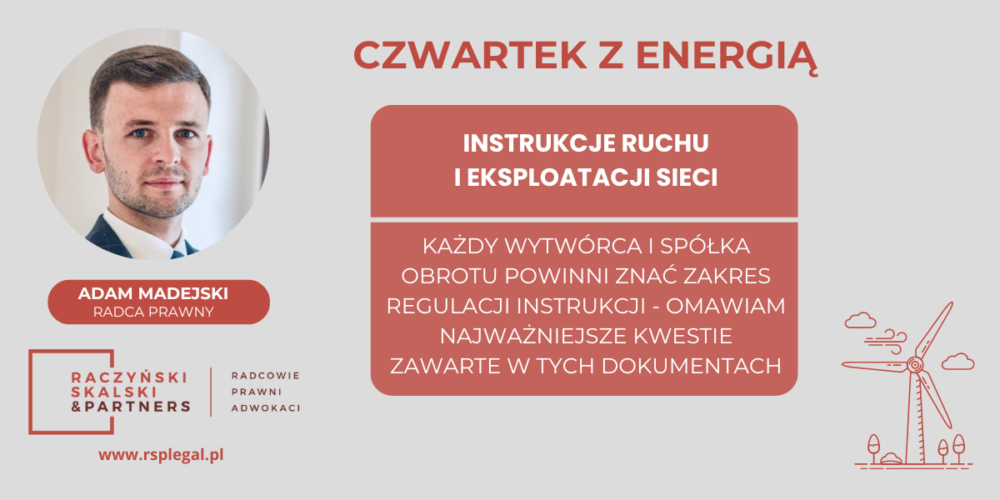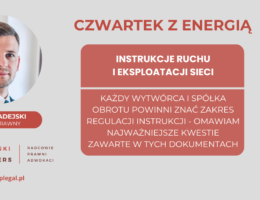The Electricity Grid Operation and Maintenance Instructions (TNCs) are issued on the basis of Article 9g of the Energy Law. These are extremely important documents that organize the operation of the power system and provide the technical and formal foundation for the activities of electricity market participants.
The content of the instructions is awe-inspiring – they usually contain several hundred pages of various types of regulations. However, it is worth remembering that these documents are intended to regulate the activities of the operator and other entities within the entire electricity system. However, it is worth familiarizing oneself with the content of the instructions, because there is information there that is helpful for the proper organization of the activity of trading, generation or balancing of electricity.
1. The binding nature of the Instructions for Network Operation and Maintenance
To begin with, perhaps the most important issue – instructions are documents that are binding on electricity system participants. All contracts entered into in the “circulation” of electricity on the grid, from the connection stage, through generation, to distribution, trading and delivery to the end user, are at least partially regulated by the provisions of the TNC. Although it does not directly follow from the provisions of the Energy Law, every system participant is obliged to apply the provisions of the TNC. Importantly, Article 56(1)(19) provides for administrative liability for failure to comply with the provisions of instructions approved by the ERO President and for other actions that threaten or disorganize the operation of electricity networks.
It is worth remembering in this context that administrative liability, including under the Energy Law, is objective in nature. This means that, as a rule, the fault of the entity is irrelevant to the assignment of responsibility and the imposition of a penalty. Professional participants in the electricity market should always take care to properly implement their statutory and contractual obligations. The possibility of waiving the penalty under Article 56(6a) of the Energy Law covers only cases of negligible harm, combined with cessation of violations or performance of obligations.
Interestingly, power system operators themselves are subject to liability for violations of the instructions. For example, the Court of Competition and Consumer Protection, in its judgment in Case XVIII AmE 143/14, indicated: This liability is objective in nature, which means that it is not subject to limitation due to the absence of an element of culpability. The mere failure of an entrepreneur to comply with the obligations set forth in the TNC, regardless of the possibility of attributing fault to the entrepreneur, constitutes the basis for imposing a fine. This is because the ERO President’s assessment is subject only to the objective circumstance related to the entrepreneur’s fulfillment of obligations under the currently effective TNC.
2. Electricity Grid Operation and Maintenance Manual – basic information
Each electricity system operator, from the transmission grid to closed distribution systems, is required to develop a grid operation and maintenance manual and submit it to the ERO President for approval (Article 9g(7) of the Energy Law). Only vertically integrated companies that additionally meet the criteria for the number of customers or scale of operations described in Article 9d(7) of the Energy Law are exempt from this obligation. In practice, this will most often apply to small closed distribution systems where the operator is also engaged in electricity trading.
Instructions can be divided into two categories – transmission and distribution. The first category of instructions is developed by Polskie Sieci Elektroenergetyczne S.A., which acts as the transmission system operator in Poland. These instructions are abbreviated as IRiESP. It consists of three parts:
1. general,
2. system balancing and congestion management,
3. conditions for use, operation, maintenance and network development planning.
A separate part of the manual is the IRiESP-OIRE document, which is a regulation for the Central Energy Market Information System, for which PSE S.A. is the designated operator.
The TNC is a document that is of most importance to generators serving large generation sources, including conventional sources, as well as to other system operators. The information contained in the TNC is important for the rules of network cooperation.
The Instructions for the Operation and Maintenance of Distribution Networks (IRiESD) are developed by each distribution system operator and have, in principle, the same systematics. It is in the TNCs that the most important regulations on the practical aspects of network operation are contained. Among the most important issues are:
1. principles of connection and network development planning – Part II
2. principles of operation of equipment, installations and networks – Part III
3. operator cooperation and transfer of information between users – Part V
4. quality parameters, quality indicators, service of system users – Part VIII
5. principles of balancing the system – Part A
6. principles of concluding distribution agreements – Part B
7. rules of designation, transmission and sharing of data – Part C
8. the procedure for changing the seller, handling notifications of concluded contracts – Part D
3. The most important regulations – trading companies
From the point of view of an energy company that sells electricity, regardless of whether we are talking about wholesale or end-user trading, the most important issues regulated by the IRiESD include the rules for notification of sales contracts or comprehensive agreements, and the procedure for designation, transmission and provision of metering data. In this regard, the instructions provide information on:
1. the data that must be provided to the operator,
2. the time limits within which activities must be carried out in the process,
3. the requirements to be met by the customer and the trading company,
4. the rules that apply in relations with other users of the system.
It is worth remembering that in the case of conducting sales of electricity to end users, the provisions on quality standards will be important. Sellers should also pay attention to the detailed regulated procedure for suspension of electricity supply and disconnection from the grid (Part II.3.).
Trading companies, in order to sell electricity in a given territory, must conclude a so-called general distribution agreement, commonly referred to as a GDA and GUD-K (for comprehensive agreements), with the relevant distribution system operator. The framework provisions of these agreements are included as an appendix to the TNC. Importantly, the provisions of the GDA and the TNC are complementary. The GDA as a contract places significant emphasis on regulations of a contractual nature, while the TNC “provides” rules for cooperation of a technical and organizational nature.
An important element of each TNC is the obligations incumbent on system operators. In a situation in which an electricity seller faces problems in its cooperation with the DSO, it is worthwhile to turn to the provisions of the manual to base its rationale on the unambiguous provisions of the TNC imposing specific obligations on the operator. Examples of the enumeration of such obligations can be found in, among others:
1. parts I.3. and I.4. (quality standards, rules for providing distribution service)
2. part VI (rules for distribution network operation)
3. part A (terms and conditions for performance of sales contracts, participation in balancing, rules for conducting reserve sales, rules for exchange of information)
4. part C.1 (transmission of metering data)
5. part D (procedure for switching vendors)
4. Most important regulations – electricity generators
For an electricity generator, the TNC is a real mine of information. From this document arise not only important obligations, but also important procedures, especially in the operation of RES installations, including non-market curtailment of their operation.
The first important regulation is Part II on the rules for connecting facilities to the electricity grid. Before starting the commercial phase of the operation of a RES installation, it is a good idea to familiarize yourself in detail with the operator’s requirements for the technical aspects of the operation of a generation source. This will certainly help in choosing the right location, as well as in smoothly passing the connection procedure and conclusion of the grid connection agreement. This also includes sources that will ultimately operate under full self-consumption conditions – as per Annex 1 to the TNC, Section 1.6, island operation of a generation facility should be included in the terms and conditions of facility connection.
For generators operating wind and photovoltaic installations – referred to as farms in the TNC – Annex 1 contains additional regulations in points 8 and 9. The requirements and obligations there include not only technical aspects and standards, but, for example, the need to ensure that the operator can turn off the source remotely. In addition, wind and photovoltaic farms should be equipped with devices that guarantee the ongoing transmission of data on the status of the installation to the operator. It is worth being aware of such regulations, as they may later affect, for example, the contractual aspects of cooperation between the generator and the trading company or the end user, as well as the issues of ensuring proper servicing of the equipment, e.g. with the turbine supplier.
Another important point is Part III, which deals with the rules for the operation of equipment, including the conduct of arrangements and requirements relating to legal and technical documentation. From a generator’s perspective, familiarization with this part can positively influence the design and construction process of a RES plant.



